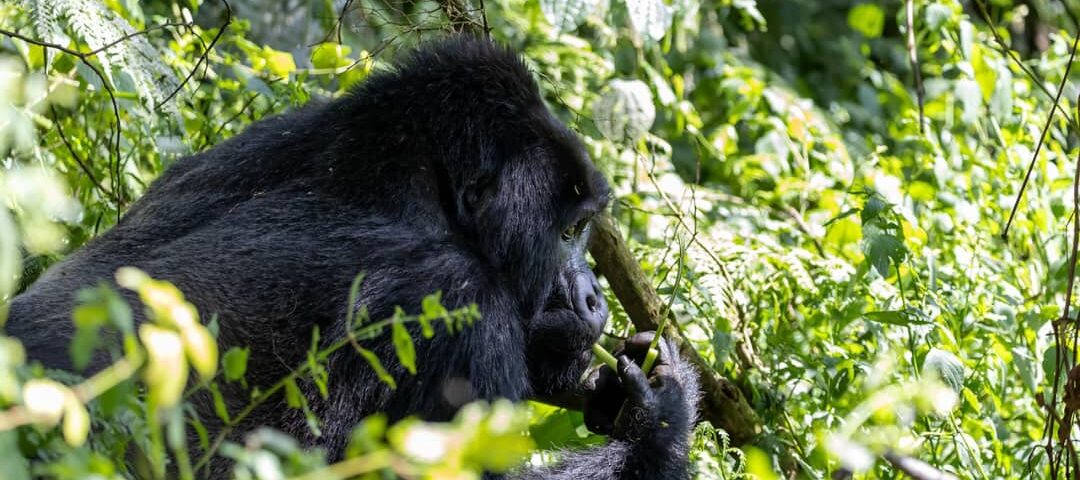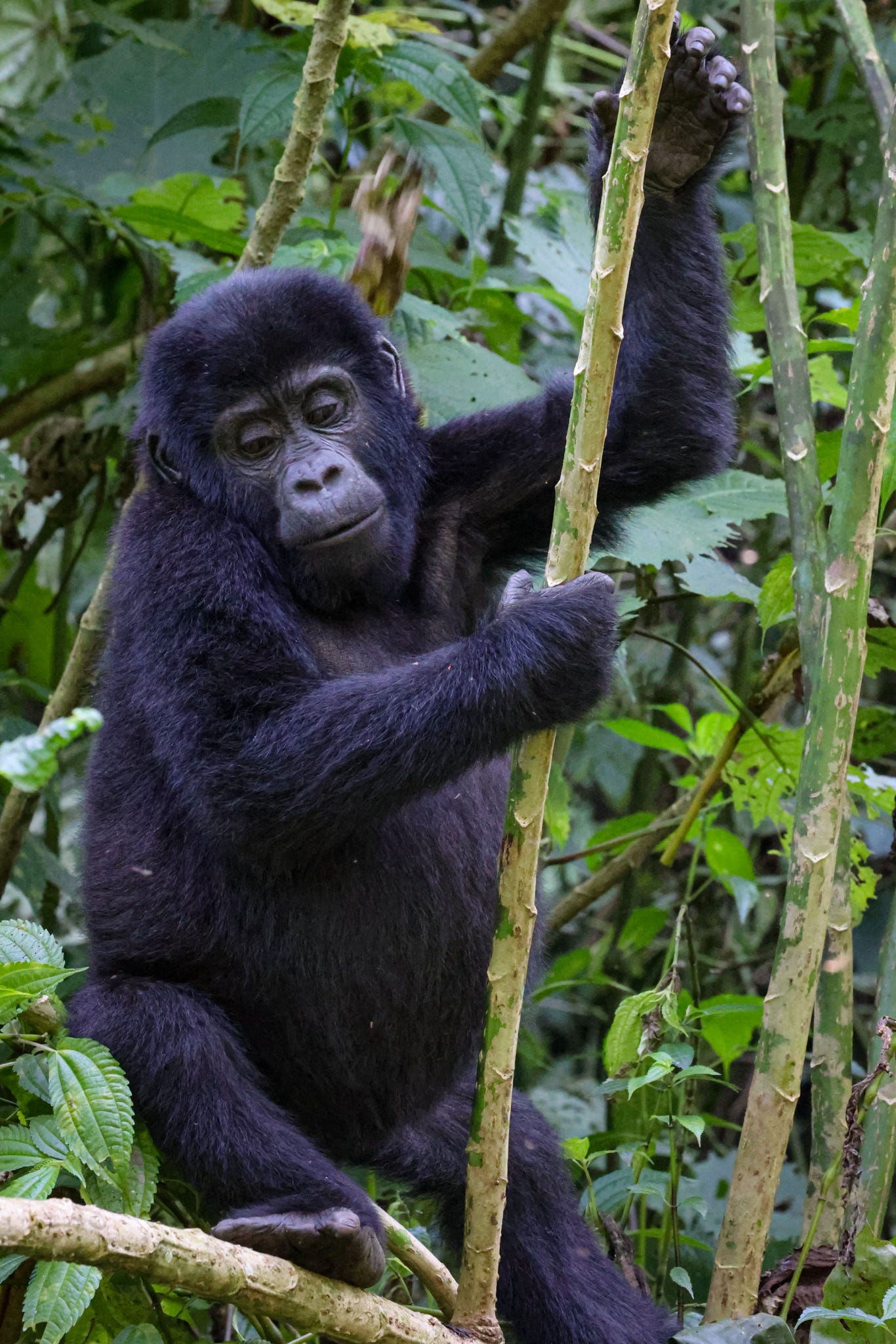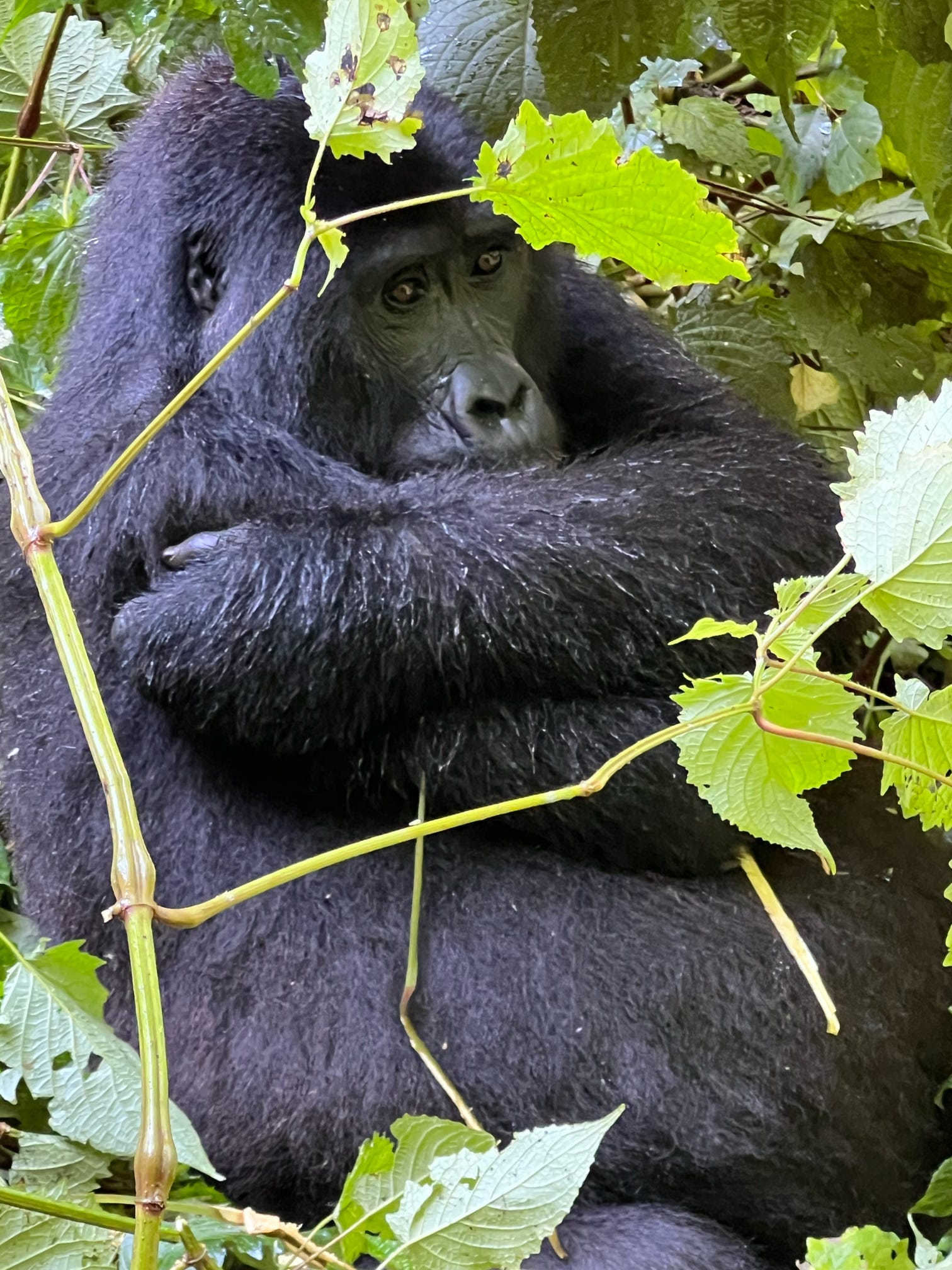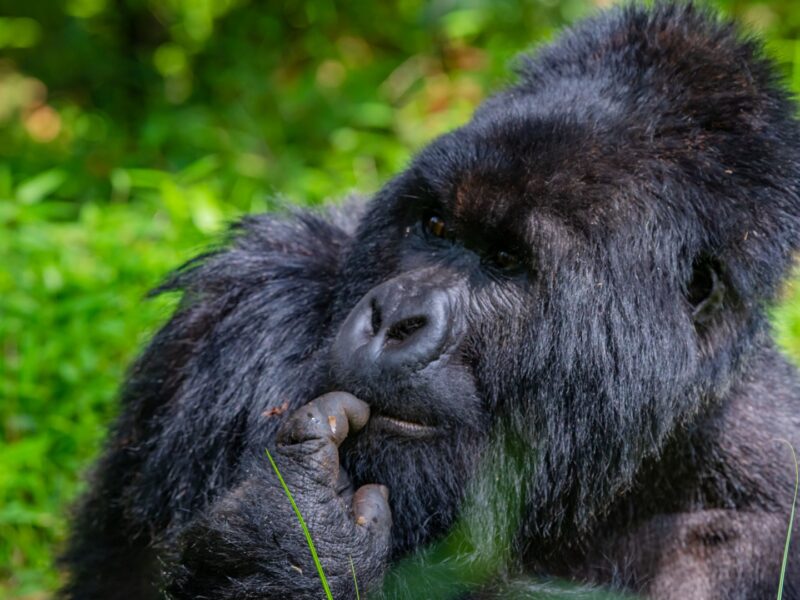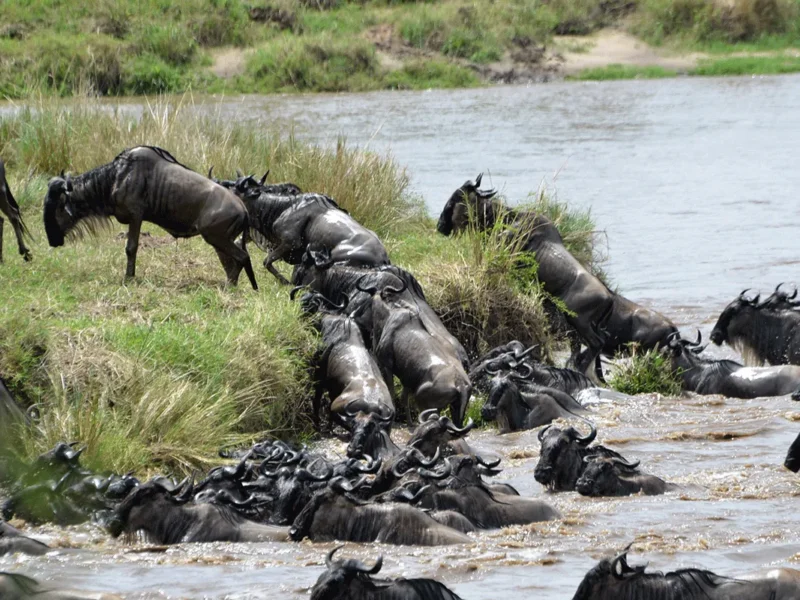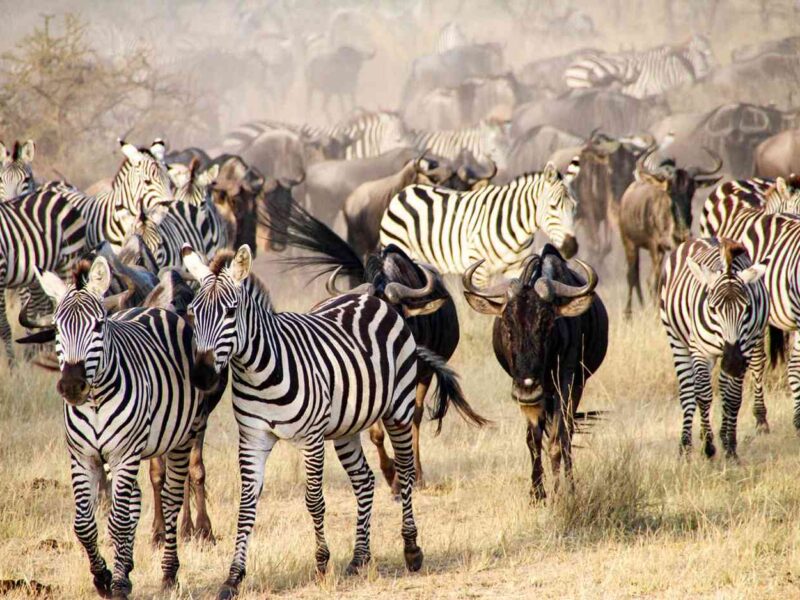The Secret Social Politics of Gorilla Families in Bwindi
September 4, 2025
The Emotional World of Gorillas
September 7, 2025Do Gorillas Recognize Tourists?
Understanding Gorilla Memory and Human Interaction
A Deeper Look into Gorilla Encounters in Uganda
Fascinating question arises during the adventures, do gorillas recognize tourists? Understanding gorilla memory and human interaction provides insight into the intelligence of these great apes.
The excitement of seeing a silverback emerge from the dense vegetation or watching infants play among branches is an experience that stays in memory forever.
When visitors plan a Uganda gorilla safari, they often focus on when to go, what to pack, and where to stay.
Yet beyond these practical safari details lies an important truth, gorillas are not passive animals.
They notice, observe and sometimes even respond differently to repeat visitors.
Uganda gorilla safaris are not only journeys into wildlife viewing but also opportunities to witness the depth of gorilla cognition.
Choosing Uganda gorilla safari lodges near the forest offers the best chances of extended encounters that highlight these interactions.
With cultural tours around these lodges, travellers also gain a broader understanding of how human memory connects with gorilla intelligence.
Gorilla Cognition – The Foundations of Recognition
Do gorillas recognize tourists? The answer lies in their highly developed cognition.
Gorillas rely on memory to navigate their complex environment, remembering food sources, water points, and safe resting areas.
This ability also extends to social recognition within families.
A silverback remembers rivals from years ago, while mothers recognize their young even after long separations.
These natural skills suggest gorillas may also recognize human faces, voices, or scents during repeated Uganda gorilla trekking experiences.
When travellers from Europe, Asia, or America visit Uganda gorilla safaris repeatedly, some notice subtle changes in gorilla behaviour.
Families may appear calmer or less cautious around familiar faces.
While every encounter remains unique, these signs indicate that gorillas are capable of retaining impressions over time.
For tourists, this possibility makes Uganda gorilla trekking more meaningful. Instead of being just another group of visitors, they may become part of a gorilla’s remembered experiences.
Selecting where to stay on a Uganda gorilla safari plays a role in this.
Lodges close to habituated gorilla groups allow easier access for return visits.
Travelers who spend more time in these areas often feel a sense of recognition from gorillas. This makes each safari moment deeply personal.
For those wondering what to pack for a Uganda gorilla safari, a quality camera becomes essential because capturing expressions that reveal recognition offers unmatched storytelling.
Habituation and the Human Connection
The process of habituation provides further answers to whether gorillas recognize tourists.
In Uganda, gorilla groups undergo years of habituation where researchers and guides gradually introduce human presence.
Over time, gorillas begin to tolerate, then accept, human proximity. This gradual adjustment relies heavily on memory.
The same guides visit repeatedly, creating familiarity. Eventually, gorillas learn that these humans pose no threat.
When tourists embark on Uganda gorilla trekking, they benefit from this work.
The calm demeanour of gorillas during treks shows how memory shapes interactions.
A gorilla family that remembers human presence as non-threatening offers a safer and more enriching safari.
This is why travellers ask when to go for a Uganda gorilla safari, often being advised to visit habituated groups in Bwindi.
Timing ensures better encounters with gorillas that already recognize humans.
Uganda gorilla safari lodges complement this by organizing cultural experiences where visitors meet local communities who participated in habituation projects.
The Batwa, for instance, share stories about their ancestral connections with gorillas, blending science with tradition.
Travelers who combine gorilla trekking with cultural tours not only see recognition in gorilla eyes but also understand the long history of coexistence between people and gorillas.
Repeat Visitors – Do Gorillas Truly Remember Faces?
A central question remains, do gorillas recognize tourists after repeat visits? Evidence from gorilla behaviour suggests that they may.
Many travellers return for a second Uganda gorilla safari and notice that certain individuals seem less cautious.
Gorillas often display curiosity, approaching familiar people more confidently. This is not random behaviour, but a reflection of recognition.
For visitors planning Uganda gorilla trekking, this possibility makes every repeat safari unique.
Unlike other wildlife safaris where animals remain distant, gorilla trekking offers personal interactions.
Each encounter feels like a continuation of a growing relationship.
When choosing where to stay on a Uganda gorilla safari, lodges close to trailheads provide repeat opportunities with the same gorilla families.
This continuity increases the chances of building familiarity with gorillas.
The question of what to pack for a Uganda gorilla safari becomes important here as well.
Beyond hiking boots and rain jackets, travellers should pack patience and mindfulness. Recognition is not instant.
It develops gradually as gorillas assess visitors through body language and behaviour.
Repeat tourists often experience moments of recognition that first-time visitors may miss, making return safaris especially rewarding.
Emotional Responses and Gorilla Memory
Another dimension of the question, do gorillas recognize tourists, lies in their emotional responses.
Gorillas are not only intelligent but also deeply emotional beings. They remember threats, friendships, and comfort.
A family that once experienced aggression from outsiders remains cautious, while one with positive habituation experiences responds with calmness.
Memory plays a central role in shaping these emotions.
During Uganda gorilla trekking, visitors often see gorillas engaging in behaviours that reveal emotional intelligence.
A silverback may allow tourists closer after repeated safe encounters, while infants sometimes display playful curiosity.
For travellers planning when to go for a Uganda gorilla safari, knowing that dry seasons allow longer observation of these emotional exchanges makes the experience more enriching.
Uganda gorilla safari lodges extend this learning beyond the forest.
Cultural programs often emphasize how Ugandans also build emotional connections with the land and its wildlife.
Visitors experience dances, music, and storytelling that highlight memory as a tool for community survival.
Just as gorillas remember, human cultures preserve memory through traditions.
Recognizing this shared trait deepens the safari experience, positioning Uganda gorilla safaris as journeys of both wildlife and human discovery.
Cultural Experiences Beyond the Trek
Understanding gorilla memory does not end in the forest. Travelers staying at Uganda gorilla safari lodges can enrich their trip with cultural experiences.
The Batwa communities living near Bwindi offer storytelling sessions where visitors learn about life before conservation.
These cultural tours provide context for the question, do gorillas recognize tourists, by showing how humans and gorillas have interacted for centuries.
When tourists ask where to stay on a Uganda gorilla safari, the best lodges are those that connect gorilla trekking with cultural discovery.
Evening performances, guided walks in local villages, and craft-making sessions add depth to the safari.
What to pack for a Uganda gorilla safari then goes beyond trekking gear, including an open mind for cultural learning.
For those planning Uganda gorilla trekking, combining cultural tours with wildlife encounters creates a complete safari holiday.
Just as gorillas remember people, people remember cultural moments that stay with them forever. The connection between memory, tourism, and culture strengthens the entire safari experience, making every journey meaningful.
Memory as the Bridge Between Humans and Gorillas
So, do gorillas recognize tourists? The answer is yes, through memory, observation, and emotional intelligence.
Each Uganda gorilla trekking adventure reveals that these primates are not passive subjects but active participants in encounters.
They remember guides, respond differently to repeat visitors, and reveal their personalities to those who return.
When to go for a Uganda gorilla safari, what to pack, and where to stay are practical questions.
Yet the deeper reward lies in understanding how gorillas interact with humans through memory.
Staying at Uganda gorilla safari lodges that combine trekking with cultural tours offers the best opportunities for recognition and learning.
By exploring this question, Ngeye Tours and Travel demonstrates authority and expertise in the Africa tourism industry.
Do gorillas recognize tourists? Understanding gorilla memory and human interaction proves that every Uganda gorilla safari is not only about seeing wildlife but about creating relationships that bridge species, cultures, and experiences across the world.


